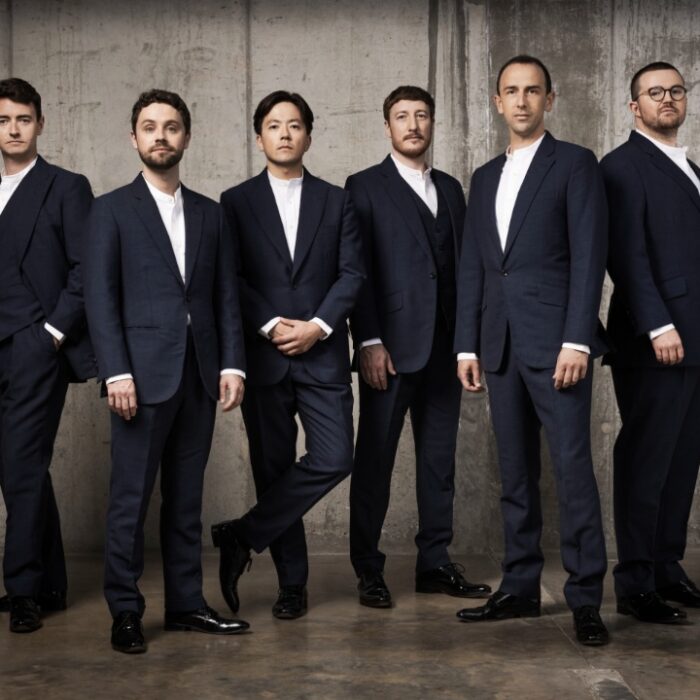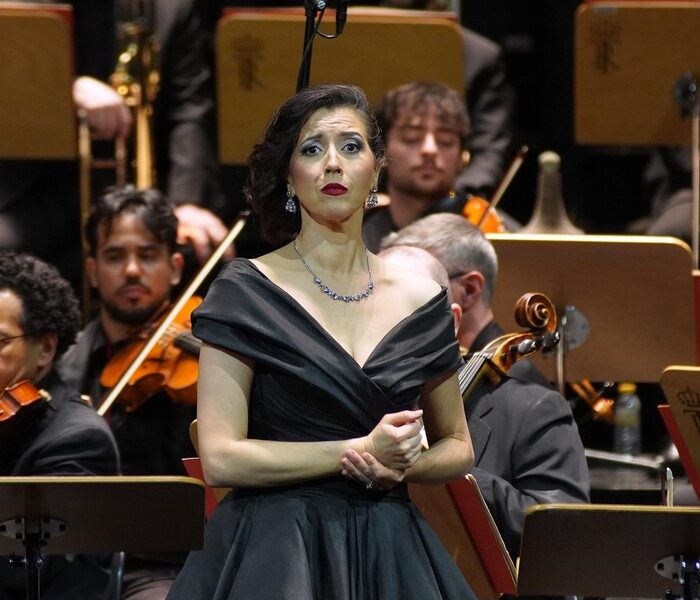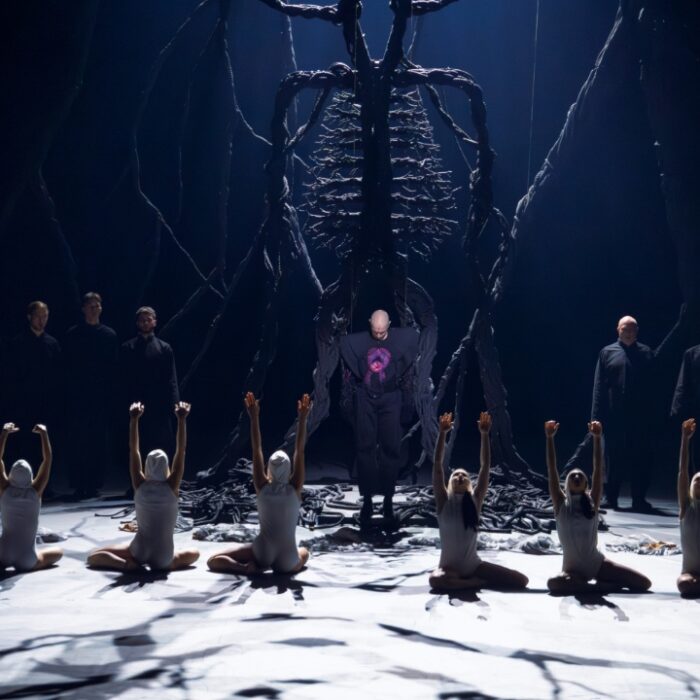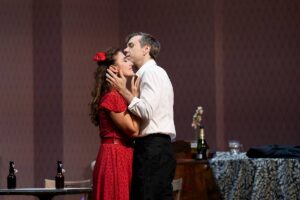
Opernhaus Zürich 2023-24 Review: La Rondine
By Laura ServideiThe Opernhaus Zürich opened the 2023-24 season with one of Giacomo Puccini’s last operas, “La rondine” and one of the least fortunate in terms of fame.
There are several reasons for this, none of which have anything to do with the artistic value of the work. The Carltheater in Vienna commissioned an operetta from Puccini, but he instructed the librettist to avoid any spoken dialogue, and proceeded to write a full blown opera. Still, “La rondine” is often referred to as an operetta in the literature, and unjustly considered a “minor” work.
The premiere took place in Montecarlo in 1917, at the height of World War I, when the public was perhaps less inclined to favorably judge a melancholy, nostalgic work depicting a decadent society and its values.
The World of ‘Rondine’
The story is set in France, during the Second Empire (1850s to 1870s), and revolves around the character of Magda, a demi-mondaine who lives with a rich patron (Rambaldo) as his mistress, a kept woman in Paris’ high society. She meets a naive young man (Ruggero) who comes from the country, they fall in love and she decides to run away with him to the Côte d’Azur. The parallel with “La traviata” is obvious, but Puccini’s treatment of this theme is quite different from Verdi’s: more than 60 years have passed and sensibilities have changed.
In the first act, in Rambaldo’s house, Magda reminisces of a love adventure in her youth, when she met a young student and they both were smitten. The love affair never materialized, not even a kiss was exchanged, but she kept this dream alive in her memory, clinging to it as the “life that never was,” full of nostalgia for something that never happened.
Her love story with Ruggero is more a desperate attempt to make the dream come true, than a committed pursuit of a different life. After seeing him briefly in Rambaldo’s house, she follows Ruggero in a café-chantant disguised as a simple girl, they fall in love and she runs away with him under these false pretenses. When he, after a few months, discloses his intention of marrying her and having a family, she realizes that her past as a lost woman will always be between them, despite their passion for one another, and leaves him after a harrowing farewell, going back to her old life.
Puccini’s music perfectly reflects the spirit of the story. It is full of melodies, but none of them are fully developed, they sound like the reminiscence of something else. The work is permeated by a subtle irony – the poet Prunier is a mockery of Gabriele d’Annunzio, exponent of the Italian decadent movement, influenced by Nietzsche; when he describes his ideal woman, comparing her to famous past femme fatales, on the word “Salome” we hear a quick quote from Strauss. The score is rife with dance music, which again helped the categorization into the “operetta” genre, but the purpose of it is another: a tribute to the joie de vivre of the Second Empire Paris.
Giacomo Puccini, Screenwriter
Director Christophe Loy gave a thoughtful, respectful presentation of the story, with minimal changes. The action is moved to the 20th century, perhaps to the 1950s, judging from the costumes (Barbara Drosihn), an update which made the story more relatable, without disturbing its logic.
Puccini, as usual, almost produced a film script: every exchange, every dialogue precisely detailed, defining where the characters should be and how they should move, and Loy respected the structure of the show with remarkable attention to detail.
The set (Étienne Pluss) showed always the same room, which represented the different places of action, with the change of a few props: Rambaldo’s house in the first act, Cafe Bullier in the second, and Magda and Ruggero’s room in the third. The atmosphere of the Côte d’Azur was successfully achieved by intelligent lighting (Fabrice Kébour): the soft, white light coming from a window, a blooming oleander were enough to call to mind the coast around Nice.
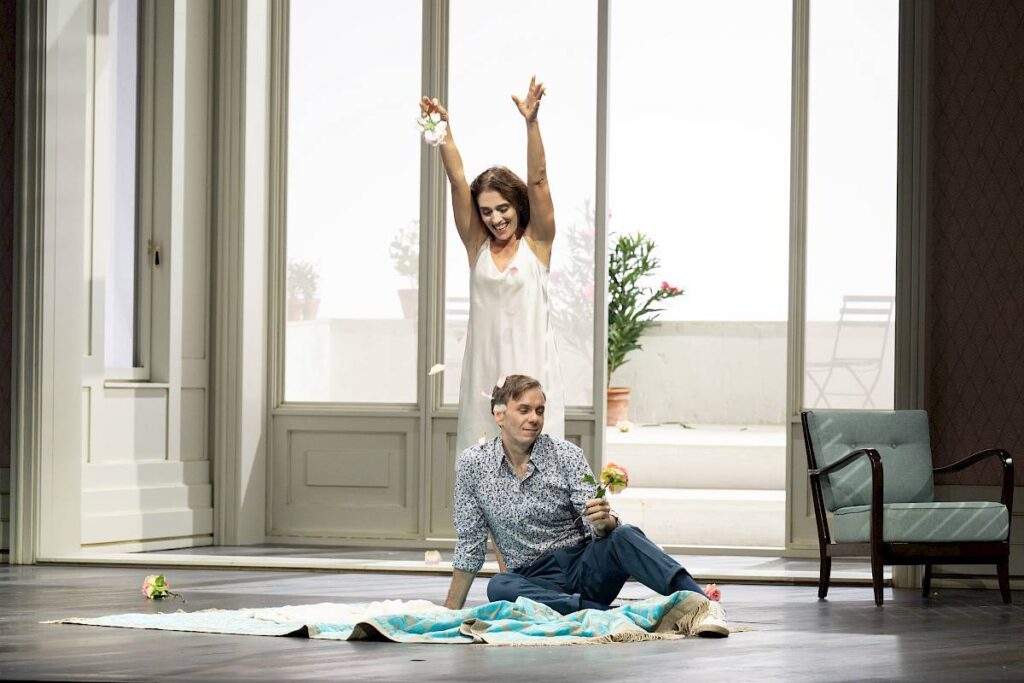
(Credit: Monika Ritterhaus)
Ermonela Jaho, Heart-Wrencher
Ermonela Jaho gave a visceral, emotionally scarring interpretation of Magda. Her ability of completely inhabiting a character left many in tears in the audience. Her supple, full soprano gave depth to Magda, her ravishing pianissimi and filati providing nuance to her emotions. It was an extraordinary performance.
Benjamin Bernheim made his debut as Ruggero, and he passed the test with flying colors. His bright tenor proved to be very suited to the passionate lover, the ease and squillo on the high notes conveying his youthful ardor. The two protagonists showed great chemistry on stage, and a remarkable generosity: each was trying to prop up, rather than upstage, the other, and the result was electrifying. The farewell duet was spectacularly heart-breaking: Bernheim was visibly in shambles at the end.
The poet Prunier was performed by Juan Francisco Gatell, his tenor lighter than Bernheim’s; he gave a very good interpretation of Magda’s soul mate. Jaho and Gatell managed to represent the strange, ambiguous relationship between Magda and Prunier, a sort of “elective affinity” based on friendship and a shared affect.
Prunier’s love interest is Lisette, Magda’s maid, sung by Sandra Hamaoui. Her bright, silvery soprano gave life to the sparkling character; she showed beautiful high notes and great ease in the delivery. Prunier and Lisette form the light-hearted couple which counterbalances the serious dynamic between Magda-Ruggero, very much like Marcello and Musetta in “La Bohème.”
Another parallel with “Bohème” is in the second act, where the scene at Bullier’s is analogous to the one at Cafe Momus, with people coming and going and all sorts of things happening. At the end of the second act, there is a great scene where Ruggero toasts to Magda’s smile (“Bevo al tuo fresco sorriso”), which becomes a duet, and then a quartet, and then the whole chorus joins in. Conductor Marco Armiliato lead the whole ensemble to a rapturous climax, at the end of which the audience exploded in never-ending cheers, with people clapping in rhythm and demanding an encore. Bernheim and Jaho, frozen on the verge of a kiss, clearly silently debated whether to do the encore and looked wistfully at Armiliato several times, but, alas, the Maestro said no.
Vladimir Stoyanov was an imposing Rambaldo, his dark baritone very suited to the serious, middle aged patron. Every other singer, as a “minor” character gave a committed performance, contributing to the success of the evening. Particularly successful was the trio of chatting women, friends of Magda, in the first act: Yuliia Zasimova, Meeta Raval, and Siena Licht Miller.
Meanwhile, Armiliato gave a passionate reading of Puccini’s score; the Philarmonia Zürich is particularly at ease in the music of this period, underlying the breadth of the musical phrases with large sweeps, highlighting the solos passages with detail and precision. Maestro Andrea del Bianco was remarkable at the piano during “Chi il bel sogno di Doretta.”
After the farewell between Magda and Ruggero, instead of having her leaving the scene, the set changes, returning us to Rambaldo’s house, with all the guests of the first act as a distraught Magda returns to her life. It was a very successful ending for a tremendously potent evening.

